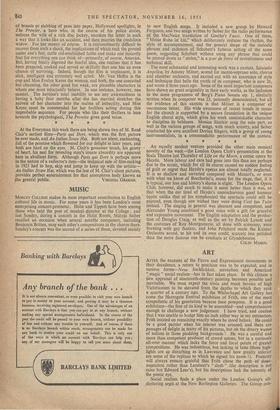MUSIC 1MORLEY COLLEGE makes its most important contribution to English
cultural life in music. For some years it has been London's most enterprising concert-promoter. Hoist and Tippett have been among those who held the post of musical director at the College ; and last Sunday, during a concert in the Hoist Room, Matyas Seiber recalled an occasion when several notable composers, including Benjamin Britten, sang each other's compositions in the chorus there. Sunday's concert was the second of a series of three, devoted mainly to new English songs. It included a new group by Howard Ferguson, and two songs written by Seiber for the radio performance of the MacNeice translation of Goethe's Faust. One of these, " Meine Ruhe 1st hin," which deliberately imitates the rhythm, the style of accompaniment, and the general shape of the melodic phrases and cadences of Schubert's famous setting of the same poem, suggesting Schubert without using any phrase that could be pinned down as "stolen," is a (our de force of inventiveness and technical skill.
The most substantial and interesting work was a cantata, Salutatio Angelica, by Antony Milner, scored for mezzo-soprano solo, chorus and chamber orchestra, and carried out with an assurance of style and technique that belie the youth of its composer, who is now 26, and wrote it three years ago. Some of the most important composers have shown no great originality in their early works, as the inclusion in the same programme of Berg's Piano Sonata op. 1, similarly written when its composer was 23, pointedly demonstrated, but all the evidence of this cantata is that Milner is a composer of uncommon talent. His wide awareness of recent trends in music for the church is supported by a secure foundation in the unique English choral style, which gives his work unmistakable character to discipline its boldness. Monica Sinclair sang the solo part, as well as the various groups of songs, with much artistry, and Seiber conducted his own excellent Dorian Singers, with a group of young instrumentalists, in a commendable performance of the cantata.
An equally modest venture provided the other main musical novelty of the week—the London Opera Club's presentation at the Scala Theatre last Thursday of Life on the Moon, a comic opera by Haydn. More labour and care had gone into this than are perhaps due to the music, which for all its charm caused no sudden feeling of guilt or regret that Haydn's operas are almost totally neglected. It is so shallow and unvaried compared with Mozart's, or even with what we know of Boccherini's, music for the stage, that, if it Is typical, our loss and history's shame is slight. The London Opera Club, however, did much to make it seem better than it was, so that when the ear tired of Haydn's unmischievous good humour (quite unlike that of his symphonies) the spectacle could still be enjoyed, even though one wished they were doing Con i fan Tune instead. The singing in general was pleasant and competent, and Alexander Young combined a good voice with a gift for graceful and expressive movement. The English adaptation and the produc- tion of Douglas Craig, as well as the set by Patrick Lynott and the costumes of Roy Montgomerie, all done with economy, were bursting with gay fantasy, and John Pritchard made the Kalmar Orchestra sound, to his and its own credit, scarcely less polished than the more famous one he conducts at Glyndebourne.
COLIN MASON.














































































 Previous page
Previous page